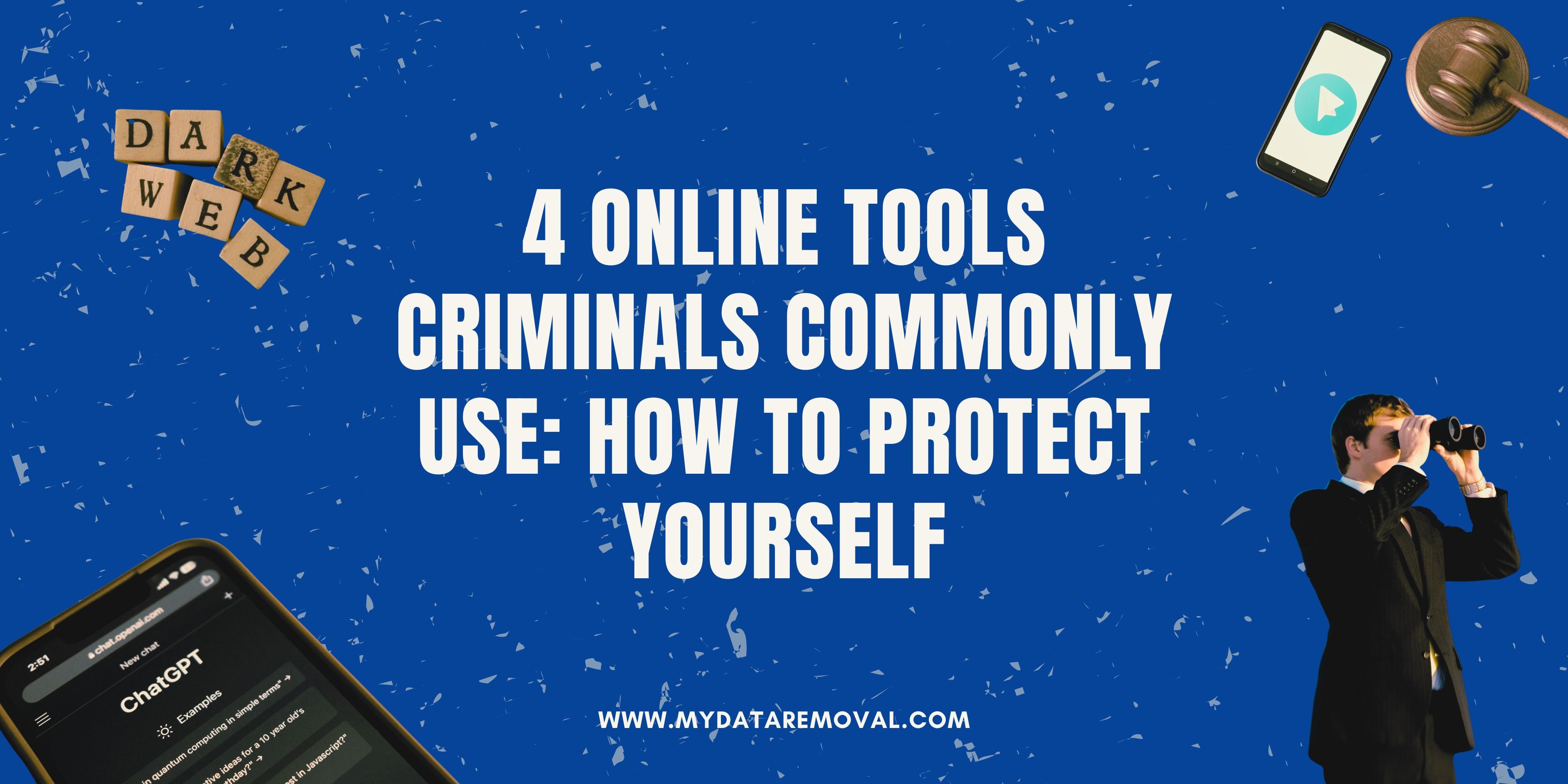4 Online Tools Criminals Commonly Use: How to Protect Yourself
Privacy in today's world is not just about locking your doors anymore. It's about what you post online, the e-commerce websites you use, or however you use your phone. When you Google your name, you'll find more personal information than you expected—details that criminals can use.
The 4 online tools and websites criminals often use are the dark web, people search websites, AI chatbots or deepfakes, and Telegram.
Following several tragic shootings, it raises questions like: How are criminals thriving? What tools make them unstoppable?
Investigations have revealed that many criminals today are using the internet and online tools to plan and execute their schemes.
No. We’re not trying to scare you. We’re just here to inform you, because knowing how criminals use the web is your first step in protecting yourself.
4 Websites and Online Tools Criminals Use
Here are 4 online tools criminals use for their schemes:
1) The Dark Web

If you haven't heard of the dark web, it's the hidden part of the internet. It's not indexed by search engines, meaning it won't appear in the search results of Google, Bing, or Yahoo.
The dark web is like a hotspot for criminals. It has multiple links that lead to various illegal activities. This includes weapons trafficking (fueling gun violence), sales of illegal drugs, hacking services, and even buying and selling leaked personal data.
According to the Threat Intelligence Lab, personal identifiable information (PII) is sold on the dark web, such as names, addresses, and Social Security numbers. Additionally, criminals sell the following information:
- Financial information (e.g., credit card numbers).
- Login credentials.
- Medical records (e.g., insurance information and patient histories).
- Corporate data.
Criminals can use these pieces of information for phishing, account takeovers, and identity theft, among other schemes. So, if you ever got hacked, even if you didn't click suspicious links, it could be that your login credentials are on the dark web, leaked from a data breach.
Sadly, once your information is on the dark web, it's nearly impossible to delete it. That's because of rapid dissemination. Your data can be copied quickly by others. So, even if you manage to delete your information, chances are that it's still on the dark web.
2) People Search Websites

People Search Websites are companies that collect your information and list it for anyone to see. You might've already heard of some of them, such as Spokeo, BeenVerified, and Whitepages. There are hundreds of these sites in the US.
For a small fee (or for free), anyone can look up the following information:
- Home address (past and present)
- Family members
- Phone numbers
- Email addresses
- Social media
- Employment history
- Criminal records
- Property records
Each of these details can be used by criminals for stalking, phishing, doxxing, and identity theft. So, if you're wondering: "How did that criminal know where Charlie's wife was? How did they find my location? It's likely that a criminal used people search websites to look for you. One example of this is the Minnesota Shooter, who used people search websites to find their targets.
3) AI Chatbots and Deepfakes

Today, Artificial Intelligence is trending. It's changing everything—from our everyday tasks to content creation and work. But as helpful as AI has been, it raises serious concerns.
Aside from the concern that AI will replace some future jobs, experts are warning that criminals are increasingly using AI for their schemes. According to the Harvard Business Review, AI will improve the quality and quantity of phishing. In the past, you could spot a phishing message through grammar errors. But with AI, criminals can ask chatbots to write engaging, personalized, and grammatically flawless phishing messages.
Then there's deepfake. Scammers use AI to clone faces and voices to create deceiving content. This helps them almost perfectly impersonate your loved ones, celebrities, and authorities you trust. Others even use AI to code malicious software. What's worse, criminals are also using AI to generate images of child sexual abuse, as reported by the New York Times.
4) Telegram

The last online tool that criminals commonly use is Telegram. They prefer this messaging app because it offers anonymity comparable to the dark web, chat encryption, and private groups (or secret channels). These make Telegram the ideal platform for criminals to sell stolen data, fake or cloned credit cards, prescription drugs, and other illegal activities.
While Telegram said it has removed violent groups and child abuse content from the app, experts stress that its content moderation is still significantly weaker compared to other platforms.
What Can You Do?

In a world like this, where criminals are thriving, can you still do anything to protect yourself? The answer is YES!
It all comes down to protecting your personal information. If criminals can't know where you live, they can't harm you. They can't send you phishing without your number or email address. If they don't know who your relatives are, your family will be safe.
To protect your information, you should opt out of people search sites. You can do this manually by searching for your information, visiting every data broker website, and following their opt-out procedures. This can take time, but it works and is definitely worth it.
If you don't have the time to do it yourself, MyDataRemoval can help. We’ll send opt-out requests on your behalf, provide monthly reports, monitor for data reappearance, and resubmit requests if needed.
Aside from opting out, there are other ways you can protect your information and family, such as the following:
- Use Strong, Unique Passwords: Make sure your accounts and digital data are safe by using strong passwords. It's also ideal to use a password manager and two-factor authentication (2FA) for better security.
- Limit What You Share Online: You and your family should be careful about what you share online or on social media. Criminals can use even your vacation photos, birthday posts, and check-ins.
- Monitor Your Digital Footprint: Check regularly if your information is showing up on the internet. A quick Google search will do. If there is, decide whether you'll leave it viewable for everyone or delete it. Ask yourself, “Can criminals use this information against me?”
Conclusion
To wrap it up, remember that you can still protect yourself in this age of digitally powered crimes. Opt out of people search websites, secure your online accounts, and limit what you share online. And don't forget to stay aware. Know what criminals use and their tactics so you know what to watch out for and how exactly you can protect yourself.
Frequently Asked Questions
What are the most common internet and computer crimes?
The most common cybercrimes in the world today are ransomware, credit card fraud, intellectual property theft, drug trafficking, credit card fraud, account hacking, and harassment.
Why do criminals use imposter websites?
Scammers impersonate websites like your bank’s—using official branding, personnel names, logos, photos, and contact information—to trick you. When they contact you, you're likely to comply with their requests.


